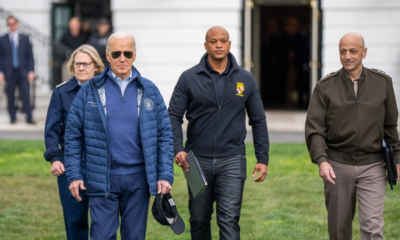Constitution
North Carolina election case reversed
The North Carolina Supreme Court vacated an earlier judgment throwing out Congressional districts as partisan gerrymanders.

Today the Supreme Court of North Carolina reversed its earlier ruling invalidating North Carolina legislative and Congressional district maps.
North Carolina reversal
The Supreme Court of North Carolina ruled, 5-2, that the Court had earlier ruled in error by even involving itself in legislative redistricting. Chief Justice Paul Newby, writing for the Court, said legislative redistricting was outside the Court’s jurisdiction. First, it’s a political matter. Second, the State Constitution vests in the General Assembly alone the authority to draw State House and Senate Districts. The State constitution says nothing about Congressional districts – but the federal constitution does. Chief Justice Newby specifically cited the “time, place and manner” clause of the U.S. Constitution. He concluded that the North Carolina General Assembly draws Congressional districts, subject to supervision by the U.S. Congress. North Carolina courts, therefore, have nothing to do with it.
The Supreme Court of North Carolina had previously ruled (Harper v. Hall) that the State’s General Assembly had illegally drawn gerrymandered maps. The Court ordered “remedial maps” for State House, State Senate, and U.S. Congressional districts. Though they accepted revised House and Senate maps, they still refused the Congressional maps, and drew their own.
Rep. Tim Moore (R-Cleveland, N.C.), Speaker of the State House, filed for an emergency stay from the United States Supreme Court. Supervising Justice Brett Kanavaugh refused, saying Midterms were just too close. But he also suggested that the Supreme Court “grant cert” in this or a similar case as soon as possible.
Now, however, the federal case could be moot – because the North Carolina court totally vacated its earlier decision.
How this came to be
The U.S. Supreme Court did grant review over the case, now called Moore v. Harper. But before the case came to oral argument, Midterms happened. And at Midterms, voters removed two Democrats (including Justice Samuel J. Ervin IV) and replaced them with Republicans. When they did that, they flipped the Court – and the Court agreed to rehear Harper v. Hall.
In the meantime, the federal Moore v. Harper case came to oral argument. CNAV characterized the arguments by Tim Moore’s lawyer as weak. Instead of directly challenging the “one person, one vote” principle, he advanced the Independent Legislature Theory. On that theory, legislatures only, and neither federal nor State courts, draw legislative or Congressional districts. But he entangled himself in details like “efficiency gaps” and fell neatly into a trap Chief Justice John Roberts set for him.
The Supreme Court later asked for re-briefing in light of Moore’s successful petition of the North Carolina Supreme Court for rehearing.
Now, of course, the North Carolina court has given Speaker Moore and his allies everything they wanted. They now can draw maps at least for Congress, and should be able to redraw them for the State House and Senate as well. Because the Court now vacates every decision the previous Court has made in this case. Moore has already said the earliest his colleagues can start redrawing those maps is this summer.
Justice Anita Earls penned a bitter 71-page dissent rooted firmly in a lament of the likely electoral outcome.
What next?
The North Carolina General Assembly will definitely redraw the Congressional maps ahead of the upcoming Presidential election. Governor Roy Cooper (Democrat) has nothing to do with it, per the State Constitution. Nor would that matter, because (thanks to a recent Party switch) Republicans enjoy supermajorities in both chambers.
The United States Supreme Court could now declare the Moore v. Harper case moot, now that the very reason for their hearing the case has changed and is no longer valid. Thus far no one has said whether Speaker Moore will move to dismiss his case as moot.
In other rulings (also reversals) today, the State Supreme Court reinstated North Carolina’s voter ID law, and rescinded the restoration of voting rights of certain ex-convicts.
CNN, NPR, WNCN-TV Channel 17 (CBS, Raleigh, N.C.), and Politico.com contributed reportage to this story.
Note: the State Supreme Court seal is under copyright. Fair use allows its use to illustrate a story about the Court’s operation.
Terry A. Hurlbut has been a student of politics, philosophy, and science for more than 35 years. He is a graduate of Yale College and has served as a physician-level laboratory administrator in a 250-bed community hospital. He also is a serious student of the Bible, is conversant in its two primary original languages, and has followed the creation-science movement closely since 1993.
-

 Executive4 days ago
Executive4 days agoWaste of the Day: Secret Settlements get Taxpayer Money
-

 Guest Columns5 days ago
Guest Columns5 days agoData Centers Are a Repeat of History in PA’s Coal Region
-

 Civilization5 days ago
Civilization5 days agoThe Northwest Passage Will Be Decided by Capability, Not Law
-

 Accountability1 day ago
Accountability1 day agoWaste of the Day: Principal Bought Lobster with School Funds
-

 Constitution19 hours ago
Constitution19 hours agoTrump, Canada, and the Constitutional Problem Beneath the Bridge
-

 Civilization3 days ago
Civilization3 days agoThe devil is in the details
-

 Executive3 days ago
Executive3 days agoTwo New Books Bash Covid Failures
-

 Executive3 days ago
Executive3 days agoThe Israeli Lesson Democrats Ignore at Their Peril









And the districts should be rooted in a fashion that does not look at ethnicity or gender, but simply on population.